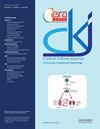Novel mutation patterns in children with steroid-resistant nephrotic syndrome
IF 3.9
2区 医学
Q1 UROLOGY & NEPHROLOGY
引用次数: 0
Abstract
Background Idiopathic Nephrotic Syndrome (NS) in children poses treatment challenges, with a subset developing Steroid-Resistant Nephrotic Syndrome (SRNS). Genetic factors play a role, yet data on pediatric SRNS genetics in India are scarce. We conducted a prospective study utilising whole-exome sequencing to explore genetic variants and their clinical correlations. Methods A single-centre prospective study (October 2018–April 2023) enrolled children with SRNS, undergoing renal biopsy and genetic testing per institutional protocol. Clinical, histological, and genetic data were recorded. DNA isolation and next-generation sequencing were conducted for genetic analysis. Data collection included demographics, clinical parameters, and kidney biopsy findings. Syndromic features were evaluated, with second-line immunosuppressive therapy administered. Patient and renal outcomes are presented for patients with and without genetic variants. Results A total of 680 pediatric NS patients were analysed, with 121 (17.8%) having SRNS and 96 consent to genetic analysis. 69 (71.9%) had early SRNS, 27 (28.1%) late. Among participants, 62 (64.56%) had reportable genetic variants. The most common were in COL4A genes, with 20 (31.7%) positive. Renal biopsy showed FSGS in 31/42 (74%) with variants, 16/28 (57.1%) without variants. Second-line immunosuppressions varied, with CNIs most common. Outcomes varied, with partial or complete remission achieved in some while others progressed to ESRD. Conclusion The study underscores the importance of genetic analysis in pediatric SRNS, revealing variants in 65.7% of cases. COL4A variants were predominant. Variants correlated with varied renal outcomes, highlighting potential prognostic implications. These findings emphasise the value of personalised approaches and further research in managing pediatric SRNS.类固醇耐受性肾病综合征患儿的新型基因突变模式
背景 儿童特发性肾病综合征(NS)给治疗带来了挑战,其中一部分患儿会发展为类固醇抵抗性肾病综合征(SRNS)。遗传因素在其中起到了一定的作用,但有关印度儿童 SRNS 遗传学的数据却很少。我们利用全外显子组测序技术开展了一项前瞻性研究,以探索遗传变异及其临床相关性。方法 一项单中心前瞻性研究(2018 年 10 月至 2023 年 4 月)招募了 SRNS 患儿,按照机构协议进行了肾活检和基因检测。记录了临床、组织学和遗传学数据。DNA分离和下一代测序用于基因分析。数据收集包括人口统计学、临床参数和肾活检结果。对综合征特征进行了评估,并进行了二线免疫抑制治疗。本文介绍了有基因变异和无基因变异患者的病情和肾脏预后。结果 共分析了 680 名小儿 NS 患者,其中 121 人(17.8%)患有 SRNS,96 人同意进行基因分析。69例(71.9%)为早期SRNS,27例(28.1%)为晚期SRNS。参与者中有 62 人(64.56%)有可报告的基因变异。最常见的是 COL4A 基因,其中 20 例(31.7%)呈阳性。肾活检显示,31/42(74%)人存在变异,16/28(57.1%)人不存在变异,均为 FSGS。二线免疫抑制剂各不相同,CNIs最为常见。结果各不相同,一些患者的病情得到部分或完全缓解,而另一些患者则发展为 ESRD。结论 该研究强调了遗传分析在小儿 SRNS 中的重要性,发现 65.7% 的病例存在变异。其中以 COL4A 变异为主。变异与不同的肾脏结果相关,突显了潜在的预后影响。这些发现强调了个性化方法和进一步研究在管理小儿 SRNS 方面的价值。
本文章由计算机程序翻译,如有差异,请以英文原文为准。
求助全文
约1分钟内获得全文
求助全文
来源期刊

Clinical Kidney Journal
Medicine-Transplantation
CiteScore
6.70
自引率
10.90%
发文量
242
审稿时长
8 weeks
期刊介绍:
About the Journal
Clinical Kidney Journal: Clinical and Translational Nephrology (ckj), an official journal of the ERA-EDTA (European Renal Association-European Dialysis and Transplant Association), is a fully open access, online only journal publishing bimonthly. The journal is an essential educational and training resource integrating clinical, translational and educational research into clinical practice. ckj aims to contribute to a translational research culture among nephrologists and kidney pathologists that helps close the gap between basic researchers and practicing clinicians and promote sorely needed innovation in the Nephrology field. All research articles in this journal have undergone peer review.
 求助内容:
求助内容: 应助结果提醒方式:
应助结果提醒方式:


